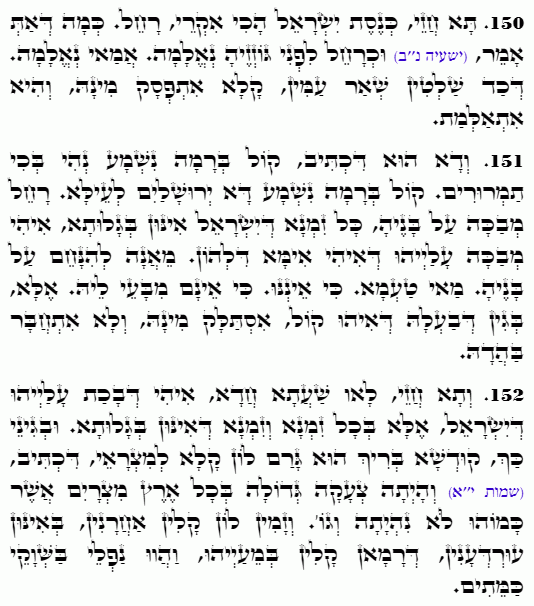Daily Zohar # 4760 – Vaera – Rachel weeps for her children
Daily Zohar 4760

Hebrew translation:
151. וְזֶהוּ שֶׁכָּתוּב קוֹל בְּרָמָה נִשְׁמָע נְהִי בְּכִי תַמְרוּרִים. קוֹל בְּרָמָה נִשְׁמָע – זוֹ יְרוּשָׁלַיִם לְמַעְלָה. רָחֵל מְבַכָּה עַל בָּנֶיהָ – כָּל זְמַן שֶׁיִּשְׂרָאֵל הֵם בַּגָּלוּת, הִיא מְבַכָּה עֲלֵיהֶם שֶׁהִיא הָאֵם שֶׁלָּהֶם. מֵאֲנָה לְהִנָּחֵם עַל בָּנֶיהָ, מָה הַטַּעַם? כִּי אֵינֶנּוּ. כִּי אֵינָם הָיָה צָרִיךְ (לִכְתֹּב)! אֶלָּא מִשּׁוּם שֶׁבַּעְלָהּ הוּא קוֹל, הִסְתַּלֵּק מִמֶּנָּה וְלֹא הִתְחַבֵּר עִמָּה.
152. וּבֹא רְאֵה, לֹא שָׁעָה אַחַת הִיא בּוֹכָה עַל יִשְׂרָאֵל, אֶלָּא בְּכָל זְמַן וּזְמַן שֶׁהֵם בַּגָּלוּת, וְלָכֵן הַקָּדוֹשׁ בָּרוּךְ הוּא גָּרַם לַמִּצְרִיִּים קוֹל, שֶׁכָּתוּב (שמות יא) וְהָיְתָה צְעָקָה גְדֹלָה בְּכָל אֶרֶץ מִצְרָיִם אֲשֶׁר כָּמֹהוּ לֹא נִהְיָתָה וְגוֹ’. וְהִזְמִין לָהֶם קוֹלוֹת אֲחֵרִים בְּאוֹתָם הַצְּפַרְדְּעִים שֶׁהֵרִימוּ קוֹלוֹת בִּמְעֵיהֶם, וְהָיוּ נוֹפְלִים בַּשְּׁוָקִים כְּמוֹ מֵתִים.
.
Zohar Vaera
Continued from previous DZ
#150
Come and see, the Congregation of Israel, which is Malchut, is called Rachel, as it is written: “וּכְרָחֵל לִפְנֵי גֹזְזֶיהָ נֶאֱלָמָה”—”And like a sheep (Rachel) before her shearers is mute” (Isaiah 53:7).
Why is she mute? It is because, at the time when other nations dominate, the voice, which is Zeir Anpin (Z “A), is cut off from her, and she becomes silent.
#151
And this is what is written:
Jeremiah 31:15
“כֹּה אָמַר יְהוָה קוֹל בְּרָמָה נִשְׁמָע נְהִי בְּכִי תַמְרוּרִים רָחֵל מְבַכָּה עַל בָּנֶיהָ מֵאֲנָה לְהִנָּחֵם עַל בָּנֶיהָ כִּי אֵינֶנּוּ.” “Thus says YHVH: “A voice was heard in Ramah, Lamentation and bitter weeping, Rachel weeping for her children, Refusing to be comforted for her children, Because they are no more.”
“Kole Barama Nishma” (“A voice is heard on high”) refers to the Jerusalem Above, which is Binah. “Rachel weeps for her children”—As long as Israel is in exile, she weeps for them because she is their mother. “She refuses to be comforted for her children.” What is the reason? “Because he is no more.”
He asks: Shouldn’t it say “כִּי אֵינָם” “because they are no more” (plural)?
The answer is: It is because her husband, who is Zeir Anpin (Z “A), called “voice,” has departed from her and is no longer connected to her.
#152
Come and see: Rachel has not wept for Israel just once, but continuously, at every moment that they remain in exile.
And because they (Israel) blemished the voice (קול) that departed from Rachel. The Holy One, Blessed be He, arranged for the Egyptians to suffer through a voice as punishment, as it is written: “וְהָיְתָה צְעָקָה גְּדוֹלָה”—”And there shall be a great cry” (Exodus 11:6). Additionally, He prepared other cries for them through the frogs, which raised their voices from within the Egyptians’ stomachs, and these frogs fell dead in the streets.
Notes:
The Zohar illustrates the interconnectedness of spiritual blemishes and their physical consequences. Israel’s actions, which disrupted the flow of the force of voice (Zeir Anpin) to Rachel, led to corresponding afflictions upon Egypt, emphasizing the balance of justice.
{||}

 Previous: Vaera
Previous: Vaera

